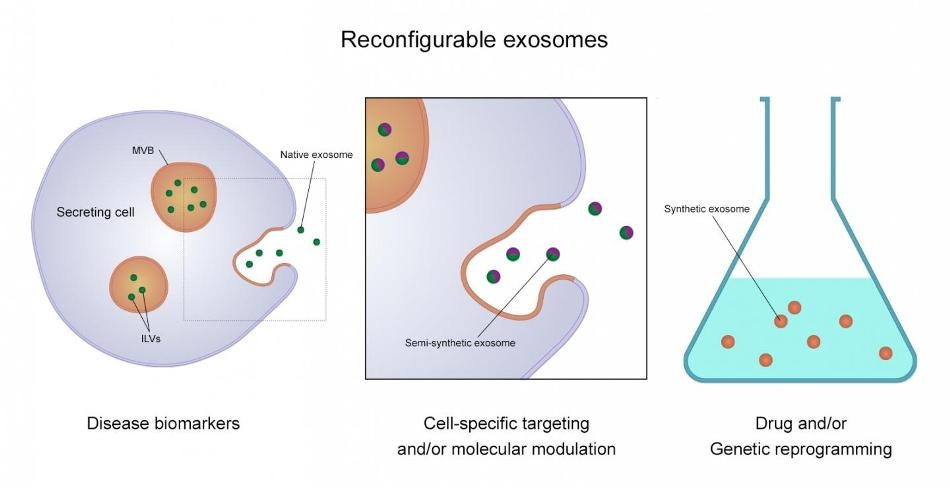Jun 23 2017
A new review highlights that tiny nanoparticles provide major potential in detecting and treating disease.
 Exosomes can be produced by cells (left), altered before production or after purification (middle), and made in the laboratory (right) depending on their final use. CREDIT: Dr Marta I. Oliveira, INL, Portugal
Exosomes can be produced by cells (left), altered before production or after purification (middle), and made in the laboratory (right) depending on their final use. CREDIT: Dr Marta I. Oliveira, INL, Portugal
Exosomes are tiny biological nanoparticles capable of transferring information between cells. These nanoparticles provide noteworthy potential in detecting and treating disease. This is considered to be the most comprehensive overview that has been concluded in this field of research.
According to Dr Steven Conlan from Swansea University, Dr Mauro Ferrari of Houston Methodist Research Institute in Texas, and Dr Inês Mendes Pinto from the International Iberian Nanotechnology Laboratory in Portugal, Regenerative Medicine and Cancer Treatment are the areas that could obtain benefits. Their commissioned paper, which is titled Exosomes as Reconfigurable Therapeutic Systems, was published on June 22nd, 2017, by Cell Press in Trends in Molecular Medicine.
Exosomes are particles developed by all cells present in the body and range from 30-130 nm in size - a nanometer refers to one-billionth of a meter. Exosomes behave as biological signaling systems, carrying proteins, lipids, RNA and DNA and communicating between cells. They are capable of driving biological processes, from transmitting information through breast milk to modulating gene expression.
The complete potential of exosomes is just slowly being revealed even though they were discovered in 1983. The Researchers demonstrate that the possible medical benefits of the nanoparticles fall into three broad categories:
- Activating immune responses to enhance immunity
- Detecting disease - by acting as disease-specific biomarkers
- Treating diseases - acting as the vehicle for drugs, for instance, bearing cancer therapies as their payload, to target tumors
Exosomes have a number of useful properties and one such property refers to their ability to cross barriers such as the plasma membrane of cells, or the brain/blood barrier. This allows them to be ideal for delivering therapeutic molecules in an extremely targeted manner.
The promising benefits of exosomes are discussed in a number of research projects - cited in the paper - under way or already completed, in the following areas:
- Diabetes
- Parkinson's
- A small-cell lung cancer trial
- Regeneration of tissue and muscle
- Enhanced testing for prostate cancer
- Stem cell-derived exosomes strengthening heart muscles
The team points out that there is more to be done before research into exosomes translates into new treatments and techniques. It is essential to consider the side effects, and a standardized approach ideal for isolating, characterizing and then storing exosomes will have to be developed.
Researchers will also have to make sure that the properties of exosomes do not cause any harm, for example, it is possible for them to transfer drug resistance and also pacify the immune system.
However, the potential indeed is extremely clear, with the Researchers describing exosomes as "increasingly promising".
Professor Steve Conlan of Swansea University Medical School, one of the authors of the paper, said,
"Our survey of research into exosomes shows clearly that they offer enormous potential as a basis for detecting and treating disease.
Further studies are necessary to turn this research into clinical outcomes, but researchers and funders should be very encouraged by our findings. Our own research in Swansea is investigating the use of exosomes and exosome-like synthetic nanoparticles in combatting ovarian and endometrial cancer.
Progress in this field depends on partnership. As the authorship of our own paper illustrates, researchers in different countries are increasingly working together in nanohealth. Swansea University has wider links with Houston and Portuguese based researchers in the field.
It's also important to build partnerships outside academia, in particular with government and companies in this fast-growing sector."